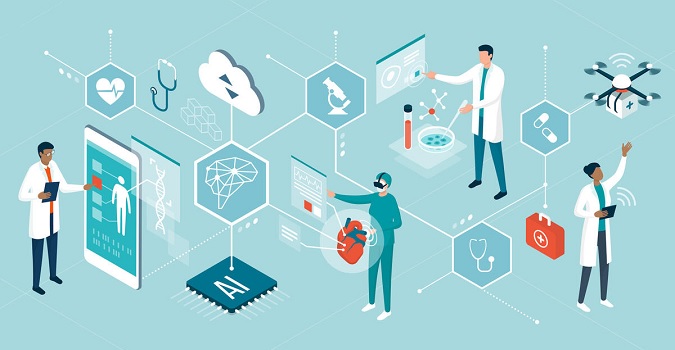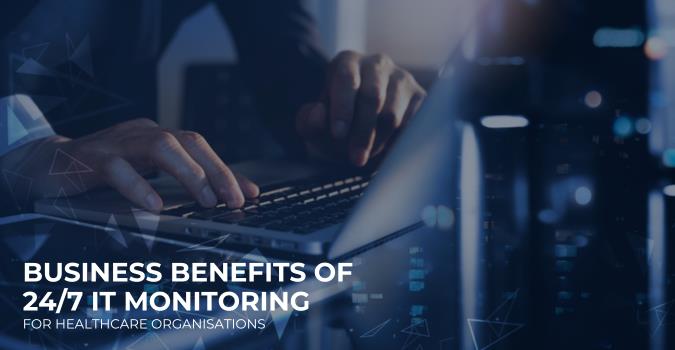Healthcare organisations rely on robust IT systems to manage patient records, facilitate telemedicine and support…

Major Cyber Security Threats Faced by Healthcare Sector in 2022
There is no surprise that hospitals and medical practices are seen as prime targets for cybercriminals. These cyber-attacks create huge risks for health organizations because they have not implemented sufficient security measures to stop them. Cyberattacks can jeopardize daily business operations as well as patient safety, but the implementation of cyber security best practices can help you to protect sensitive data against security threats.
The large number of cyber-threats means a major risk to healthcare businesses and their data security. These cyber security threats are ranging from malware threats to distributed denial of service (DDoS) attacks that puts patients’ security at risk as well as compromise the integrity of healthcare management systems. Following are the major types of cyber attacks that are faced by the healthcare industry in 2022.
Phishing Scams
Phishing is a type of cyber attack that is used to steal user data, including login details and credit card numbers. It is one of the most common cyber security threats in the healthcare industry. Phishing is usually complying to infect the recipient with wicked links. Emails are most the prevalent aspect used for phishing and these emails are looks very informative and usually reference a well-reputed medical disorder to incentify link clicking. When a link in a phishing email is clicked, users are directed to a lure web page usually reflecting a login page for acquainted internal software. Once the user submitted their credentials, cyber attackers quickly utilize them to attain access to healthcare systems.
Ransomware Attacks
Ransomware attacks are the second major risk for the healthcare industry and during the attack, the malicious software is installed into the system by a phishing attack. When a ransomware attack happens, malware is infiltrated into a network to contaminate and encrypt sensitive information until completion.
The main cause for its majority is that hackers apprehend how crucial it is for the healthcare sector to run operations smoothly and to maintain patients’ data without losing it. The ransomware attacks are gradually updating employing the latest technologies to automate attacks.
The cyber attackers have created their interpretation Raas (Ransomware-as-a-Service) encouraged by the implementation efficiencies of the Baas (Business as a Service) model. Under the model, the usual technical understanding is no longer a requirement for embarking on a ransomware attack. To respond quickly to crucial cybersecurity attacks, healthcare businesses should be employed with the best cyber security protocols.
Data Breaches
The third major cybersecurity challenge for the healthcare industry is a data breach. In the past few times, the healthcare industry faced an extensive number of data breaches as compared to other industries. HIPAA (Health Insurance Portability and Accountability Act) establishes strict conditions for protecting patients’ information and other sensitive data from malicious activities.
Cybersecurity voids open points for cybercriminals to steal the patient data, it could allow indirect access to sensitive data, such as credit card numbers, social security numbers, and even medical device intellectual property. Such overlooked vulnerabilities can be detected on time by implementing the best cybersecurity solutions.
DDoS Attacks
The distributed-Denial-of-Service attack is the fourth major cybersecurity challenge. A large number of fake contact pleas are directed at a targeted server, forcing it offline. During the DDoS attack, numerous IoT devices are conscripted into a botnet through malware.
DDoS attacks disturb other attacks without having to compromise a network. It makes it easier to deploy at a large scale. The DDoS attackers could force healthcare businesses offline and discontinue their attack if a ransom is settled.
Steps To Increase Security Protocols
Protect Your Healthcare Business Against Cyber Attacks by adopting the following four resilient cybersecurity measures: Protect Your Healthcare Business Against Cyber Attacks
- Improvise Visibility
You can detect cyberattack risks by implementing a surface monitoring solution, it will quickly show all vulnerabilities connecting with cloud solutions within a private network.
- Increase Third-Party Security
65% of data breaches happen through compromised third-party security. Increasing security measures of third-party include a directed effort between cyber risk assessments, rating of security, and 3rd Party Tiering.
- Train Your Employees About Cyber Challenges
To prevent phishing attacks and other clever, train your employees and spread about cybercrimes. They should be educated about how to recognize typical cyber threats.
- Enforce Multi-Factor Authentication
The easiest way to implement cyber security measures, and it could be enough of an impediment to prevent a malicious attempt. More than 80% of cyber-attacks could be prevented with Multi-Factor Authentication. All healthcare businesses should be enforcing MFA as a basic security measure.
Get the Best Cybersecurity Solutions
Are you facing cybersecurity threats and want to secure important healthcare information? No need to look further, MedicalIT.Services provide AI-Based Healthcare Cybersecurity Solutions with health check features to enhance your network security. Contact us to get a free one-hour cyber security consultancy.
Related To Healthcare Cybersecurity:




